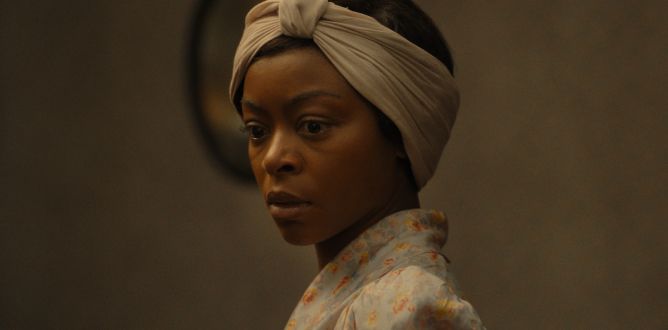The Piano Lesson Parent Guide
The film asks big questions and offers suggestions; not answers.
Parent Movie Review
Boy Willie (John David Washington) has made the long and (for a black man in 1936) dangerous journey from Mississippi to Pittsburgh, and he has big plans for his life. A loathsome white farmer back home, James Sutter (Jay Peterson), has fallen into his own well and died, leaving his land for sale. Boy Willie, tired of the limited opportunities available to him, sees the land as his shot at freedom. To get enough money together to buy it, he’ll need to convince his sister Berniece (Danielle Deadwyler) to sell a family heirloom: A large engraved piano, carved by their enslaved grandfather for Sutter’s ancestors. Berniece has no intention of selling the piano, and no intention of playing it, either. Boy Willie has no intention of leaving her home in Pittsburgh without it. As the two butt heads over the piano, it becomes clear that their different visions of the instrument might be irreconcilable. More worryingly, it looks like the piano might be haunted.
Adapted from the August Wilson play of the same name and part of his Pittsburgh Cycle, the film focuses on the way race and history shape the lives of its characters. Other films have been adapted from the cycle - Ma Rainey’s Black Bottom and Fences - and while they aren’t sequels in the sense of the continuity of a single story, Wilson’s sharp writing shines clearly in all three. All provide insightful perspectives, not just on politics or race, but on human nature and the turbulence inherent in family.
Content concerns are limited, but not absent. There is little profanity, but at least 15 uses of a racial slur, and characters are seen drinking and smoking nearly constantly. There are also a few suggestive moments and conversations, although no nudity or sexual actvity is seen. This isn’t a film for young viewers, but teens shouldn’t have too many issues.
The Piano Lesson confronts difficult questions about how to come to terms with an imperfect past, and the story handles them capably. Characters are vibrant and well performed, bringing Wilson’s story to life. The movie never quite shakes off its own legacy from the stage, but I don’t think it needs to - it forces its audience into considering the story from multiple perspectives, providing few answers, but many suggestions. It’s well worth watching, and for those of you who don’t want to rush out to a theater right away, it’ll be on Netflix on November 22nd of this year. Give it a look.
Directed by Malcolm Washington. Starring Samuel L. Jackson, John David Washington, Ray Fisher. Running time: 125 minutes. Theatrical release November 8, 2024. Updated November 14, 2024
Watch the trailer for The Piano Lesson
The Piano Lesson
Rating & Content Info
Why is The Piano Lesson rated PG-13? The Piano Lesson is rated PG-13 by the MPAA for strong language, violent content, some suggestive references and smoking.
Violence: A character is seen falling into a well. A boxcar with people inside it is burned, killing all of them. A ghostly corpse is seen several times, ultimately attacking and strangling a character.
Sexual Content: There are several sexual references and innuendoes. A woman is briefly seen from the neck up in a bath.
Profanity: There are occasional uses of mild curses. There are fifteen uses of a racial slur.
Alcohol / Drug Use: Adult characters are seen drinking and smoking on a regular basis.
Page last updated November 14, 2024
Loved this movie? Try these books…
A kid-friendly story about family and land from Mississippi in the 1930’s can be found in Mildred D. Taylor’s Roll of Thunder, Hear My Cry, and its sequels: May the Circle Be Unbroken and The Road to Memphis.Home Video
Related home video titles:
Other adaptations of August Wilson’s plays include Fences and Ma Rainey’s Black Bottom. Netflix also distributed a documentary called Giving Voice about African-American student actors competing for the August Wilson Monologue Competition.

